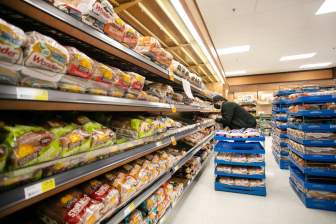As Canadians continue to grapple with a cost-of-living crisis, one in three reports being in “bad” or “terrible” financial shape, a new poll has found.

The Angus Reid Institute surveyed 1,600 Canadians across the country in March, and found 40 per cent are drawing money from accounts they normally try not to touch in order to make ends meet. Thirty-five per cent also said they’ve deferred a recent contribution to their RRSP or TFSA account.
“For one-in-ten, the situation has been so difficult they’re either borrowing from friends and family (13 per cent), selling assets (11 per cent), or seeking out a bank loan (8 per cent),” reads an April 6 release from Angus Reid.
Almost 70 per cent of Canadians reported cutting back on discretionary spending in recent months, which is 14 points higher than reported around this time last year, the institute said.
The federal government tabled its 2023-2024 budget last month with a promise to cut more than $15 billion in spending, and deliver on measures that reduce costs for lower-income Canadians.

Get breaking National news
It includes a $2.5-billion, one-time “grocery rebate,” for example, an expanded dental care program, and a pledge to crack down on “junk fees” — the extra costs tacked onto concert tickets, airfare, or food deliveries before checkout. It also proposes tax changes to help low-income households and the introduction of a code of conduct directing lenders to help Canadians with ballooning mortgage costs.

Experts have said the budget won’t likely fuel inflation, which remained at 5.2 per cent as of February. Food inflation, however, reached 10.6 per cent — the seventh month of double-digit price increases.
Of those who reported being in “terrible” financial shape, 94 per cent told the Angus Reid Institute it has been difficult to feed their households. Eighty per cent of those in “bad” shape said the same.
Some 45 per cent of those polled, meanwhile, said they have not received additional compensation from their employer over the past 12 months as costs have soared.
In British Columbia, 42 per cent of respondents said they had withdrawn money from their savings or rainy day accounts to deal with regular expenses, while 14 per cent reported having sold an asset, such as stocks or cars.
Seven per cent of British Columbians took out a bank loan and 11 per cent borrowed from friends or family. Less than half reported difficulty affording groceries and 52 per cent reported they were in “good” financial shape.
With its sample size, the poll could contain a margin of error of plus or minus two percentage points.
With files from Sean Boynton








Comments